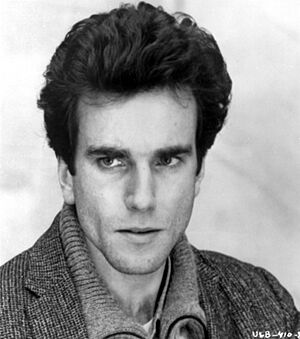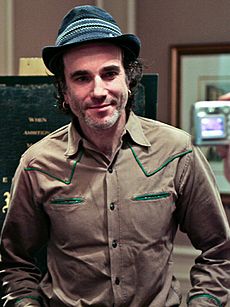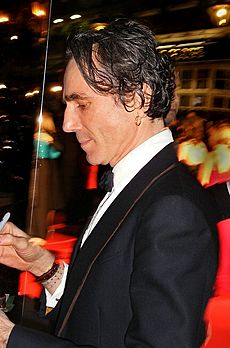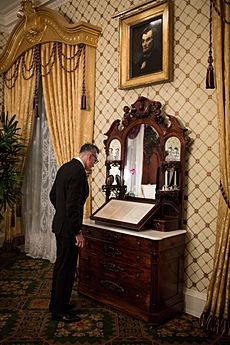Daniel Day-Lewis facts for kids
Quick facts for kids
Daniel Day-Lewis
|
|
|---|---|
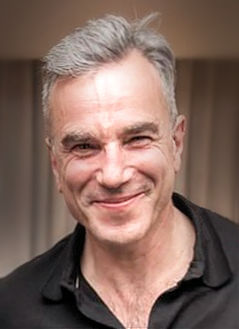
Day-Lewis in 2013
|
|
| Born |
Daniel Michael Blake Day-Lewis
29 April 1957 London, England
|
| Citizenship |
|
| Alma mater | Bristol Old Vic Theatre School |
| Occupation | Actor |
| Years active | 1971–1997; 2000–2017; 2024–present |
| Spouse(s) | |
| Partner(s) | Isabelle Adjani (1989–1995) |
| Children | 3 |
| Parents |
|
| Relatives |
|
| Awards | Full list |
Sir Daniel Michael Blake Day-Lewis (born 29 April 1957) is a famous English actor. Many people consider him one of the greatest actors ever. He has won many awards, including three Academy Awards (Oscars), four BAFTA Awards, three Screen Actors Guild Awards, and two Golden Globe Awards. In 2014, he was made a knight for his contributions to drama.
Born and raised in London, Day-Lewis showed great talent on stage at the National Youth Theatre. He then studied acting for three years at the Bristol Old Vic Theatre School. He is known for his "method acting," which means he deeply researches and stays in character for his roles. He likes to keep his private life secret and rarely gives interviews or appears in public.
Day-Lewis acted in both plays and films in the early 1980s. He joined the Royal Shakespeare Company and played Romeo in Romeo and Juliet. He also had roles in films like Gandhi (1982) and The Bounty (1984). He became well-known for his roles in My Beautiful Laundrette (1985) and A Room with a View (1985).
He won three Academy Awards for Best Actor. These were for playing Christy Brown in My Left Foot (1989), an oil tycoon in There Will Be Blood (2007), and Abraham Lincoln in Lincoln (2012). He was also nominated for Oscars for In the Name of the Father (1993), Gangs of New York (2002), and Phantom Thread (2017). Other important films include The Last of the Mohicans (1992) and The Age of Innocence (1993). He took breaks from acting twice, once from 1997 to 2000 to learn shoemaking, and again from 2017 to 2024. He returned to acting in October 2024.
Contents
Early Life and Education
Daniel Michael Blake Day-Lewis was born on 29 April 1957 in Kensington, London. His father was the poet Cecil Day-Lewis, and his mother was the actress Jill Balcon. His older sister, Tamasin Day-Lewis, is a television chef. His father was from Ireland and became the Poet Laureate in 1968. Day-Lewis's mother was Jewish. Her family came to England from Latvia and Poland. His grandfather, Sir Michael Balcon, led Ealing Studios and helped build the British film industry. An award for British cinema is given each year in his honor.
When Daniel was two, his family moved to Greenwich. He went to primary schools there. He learned to fit in by copying the local accent and ways of speaking. He later said this was his first convincing performance.
In 1968, his parents sent him to Sevenoaks School in Kent. There, he found his main interests: woodworking, acting, and fishing. After two years, he moved to Bedales in Petersfield, Hampshire, which had a more creative atmosphere. At age 14, he made his film debut in Sunday Bloody Sunday. He played a vandal in a small, uncredited role. He loved getting paid to damage cars for the movie.
His father passed away in 1972. By 1975, Day-Lewis had to choose a career. He was good at acting at the National Youth Theatre. He tried to become a cabinet maker but was turned down. Then, he was accepted into the Bristol Old Vic Theatre School. He studied there for three years and later performed at the Bristol Old Vic theatre.
John Hartoch, his acting teacher, remembered him as quiet but very focused. He said Day-Lewis had a "burning quality" and that it was clear he was "someone rather special."
Acting Career
Early Roles in the 1980s
In the early 1980s, Day-Lewis worked in theatre and television. He had a small part in the film Gandhi (1982). In this movie, he played a young man who bullies the main character. Later in 1982, he got a big theatre role in Another Country. He then played a loyal first mate in The Bounty (1984). He also joined the Royal Shakespeare Company, playing Romeo in Romeo and Juliet.
In 1985, Day-Lewis received praise for his role in My Beautiful Laundrette. He played a young gay English man in a relationship with a Pakistani youth. The film is set in London in the 1980s. This movie is one of the top 100 British films of the 20th century.
That same year, he gained more attention in A Room with a View. He played a very proper upper-class man. In 1987, Day-Lewis starred in The Unbearable Lightness of Being. He played a Czech surgeon. During the eight months of filming, he learned Czech. He also started his practice of staying in character even when not filming. During this time, he was seen as one of Britain's most exciting young actors. He and other young British actors were called the "Brit Pack".
Day-Lewis continued his "method acting" in 1989 for his role as Christy Brown in My Left Foot. Christy Brown was a writer and painter born with cerebral palsy, who could only control his left foot. Day-Lewis visited clinics for people with disabilities to prepare. He stayed in character throughout filming. He used a wheelchair and had crew members move him around. He even had them spoon-feed him to understand Brown's life fully. This role won him many awards, including the Academy Award for Best Actor.

In 1989, Day-Lewis returned to the stage to play Hamlet at the Royal National Theatre in London. During one performance, he became very upset and left the stage. He was replaced by another actor. Although it was officially said to be exhaustion, Day-Lewis later explained it was like seeing his own father's ghost. He meant it as a metaphor for exploring his own feelings through the role. He has not acted on stage since this event. The media attention after this made him decide to move to Ireland in the mid-1990s for more privacy.
Success in the 1990s
Day-Lewis starred in the American film The Last of the Mohicans (1992). For this role, he trained hard. He learned to live off the land, camping, hunting, and fishing. He also improved his woodworking skills and learned to make canoes. He carried a long rifle all the time during filming to stay in character.
Stories of his immersion in roles are legion. Playing Gerry Conlon in In the Name of the Father, Day-Lewis lived on prison rations to lose 30 lb, spent extended periods in the jail cell on set, went without sleep for two days, was interrogated for three days by real policemen, and asked that the crew hurl abuse and cold water at him. For The Boxer in 1997, he trained for weeks with the former world champion Barry McGuigan, who said that he became good enough to turn professional. The actor's injuries include a broken nose and a damaged disc in his lower back.
He worked again with director Jim Sheridan on In the Name of the Father. In this film, he played Gerry Conlon, who was wrongly accused of a bombing. Day-Lewis lost a lot of weight for the part. He kept his Northern Irish accent even when not filming. He also spent time in a prison cell on set. He even asked crew members to throw cold water at him and yell at him. This role earned him another Academy Award nomination.
In 1993, Day-Lewis played Newland Archer in Martin Scorsese's film The Age of Innocence. To prepare, he wore 1870s-style clothing around New York City for two months. This included a top hat, cane, and cape. Critics praised his performance.
In 1996, Day-Lewis starred in The Crucible. During the filming, he met his future wife, Rebecca Miller, who is the daughter of the play's writer. Critics called his performance "powerful." He then starred in Jim Sheridan's The Boxer (1997). He played a former boxer and IRA member just out of prison. For this role, he trained with former boxing world champion Barry McGuigan. McGuigan was so impressed that he thought Day-Lewis could have become a professional boxer.
After The Boxer, Day-Lewis took a break from acting. He went to Florence, Italy, and became interested in shoe-making. He trained as a shoe-maker for a while.
2000s and Beyond
After three years, Day-Lewis returned to acting in Gangs of New York (2002), directed by Martin Scorsese. He played the villainous gang leader William "Bill the Butcher" Cutting. To get into character, he learned to throw knives from circus performers. He stayed in character and used his character's New York accent even between takes. He even refused to wear a warmer coat when he had pneumonia because it wasn't right for the time period. Critics praised his "electrifying performance." This role earned him his third Oscar nomination.
In 2005, Day-Lewis starred in The Ballad of Jack and Rose, directed by his wife, Rebecca Miller. He played a dying man. He lived separately from his wife during filming to feel the isolation his character felt.
In 2007, Day-Lewis starred in There Will Be Blood. He played Daniel Plainview, an oil tycoon. The film and his performance received wide praise. He won the Academy Award for Best Actor, a BAFTA Award, and a Golden Globe for this role. When he won the Oscar, he dedicated it to actor Heath Ledger, who had recently passed away.
In 2009, Day-Lewis starred in the musical film Nine as film director Guido Contini. The movie had many famous actresses. His performance was praised, and he was nominated for a Golden Globe.
Day-Lewis played Abraham Lincoln in Steven Spielberg's film Lincoln (2012). He spent a year preparing for the role, reading over 100 books about Lincoln. He also worked with a make-up artist to look like Lincoln. He spoke in Lincoln's voice throughout the entire filming. Spielberg said he never asked Day-Lewis about his acting process. Lincoln was a big success and Day-Lewis's performance was highly praised. In November 2012, Time magazine featured him on its cover as the "World's Greatest Actor."
In 2013, Day-Lewis won his second Golden Globe and fourth BAFTA Award for Lincoln. At the 85th Academy Awards, he became the first actor to win three Best Actor Oscars. His former teacher, John Hartoch, said he was very proud of Day-Lewis's achievements. He said Day-Lewis manages his career with "great integrity" and is not interested in being a celebrity, only in his acting.
After winning the Oscar for Lincoln, Day-Lewis announced he would take another break from acting. After five years, he returned to star in Phantom Thread (2017). He played an obsessive dressmaker in 1950s London. The film and his performance were highly praised, and he was nominated for another Academy Award.
Before Phantom Thread was released in June 2017, Day-Lewis announced he was retiring from acting. He said he needed to believe in the value of his work, and lately, he didn't. However, on 1 October 2024, it was announced that Day-Lewis would return to acting after a seven-year break. He is set to star in Anemone, a film directed by his son, Ronan Day-Lewis.
Acting Style and Reputation
Day-Lewis is known as a method actor. This means he deeply commits to his roles and researches them thoroughly. He often stays in character during filming, which sometimes affects his health. He is very selective about his roles, acting in only a few films since 1998, often with years between projects. He protects his private life and rarely gives interviews.
After his third Oscar win in 2013, many people debated if Day-Lewis was among the greatest actors in history. He himself said it was "daft" to be called the "world's greatest actor" because it changes all the time. Other actors respect him greatly. Michael Simkins of The Guardian wrote that Day-Lewis is "a class apart" and that we might not see another actor like him for a long time.
Personal Life
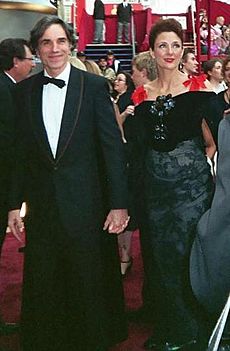
Day-Lewis keeps his private life very quiet. He had a relationship with French actress Isabelle Adjani for six years. Their son was born in 1995.
In 1996, while working on the film The Crucible, he met Rebecca Miller, the daughter of the play's writer. They married later that year, on 13 November 1996. They have two sons together. They live in Manhattan and Annamoe, Ireland.
Day-Lewis has dual British and Irish citizenship since 1993. He has lived in his Annamoe home since 1997. He said he thinks of England as his country but couldn't live there because the press made his life too public. He supports the football club Millwall. He is also an Ambassador for The Lir Academy, a drama school in Dublin.
In 2005, he visited the Gaza Strip with Médecins Sans Frontières, a medical charity. In 2010, he received an honorary degree from the University of Bristol. In 2012, he donated his father's papers, including early writings and letters, to the University of Oxford. In 2015, he became the honorary president of the Poetry Archive, a website with recordings of poets reading their work.
In 2008, when he received an Oscar from Helen Mirren, he knelt before her. She tapped him on the shoulders with the Oscar, and he joked that it was the closest he would get to a knighthood. In 2014, he was officially made a knight for his services to drama. Prince William, Duke of Cambridge, knighted him at Buckingham Palace on 14 November 2014.
Film Roles
| Year | Title | Role | Director |
|---|---|---|---|
| 1971 | Sunday Bloody Sunday | Child Vandal (uncredited) | John Schlesinger |
| 1982 | Gandhi | Colin | Richard Attenborough |
| 1984 | The Bounty | John Fryer | Roger Donaldson |
| 1985 | My Beautiful Laundrette | Johnny | Stephen Frears |
| A Room with a View | Cecil Vyse | James Ivory | |
| 1986 | Nanou | Max | Conny Templeman |
| 1988 | The Unbearable Lightness of Being | Tomas | Philip Kaufman |
| Stars and Bars | Henderson Dores | Pat O'Connor | |
| 1989 | My Left Foot | Christy Brown | Jim Sheridan |
| Eversmile, New Jersey | Fergus O'Connell | Carlos Sorin | |
| 1992 | The Last of the Mohicans | Nathaniel "Hawkeye" Poe | Michael Mann |
| 1993 | The Age of Innocence | Newland Archer | Martin Scorsese |
| In the Name of the Father | Gerry Conlon | Jim Sheridan | |
| 1996 | The Crucible | John Proctor | Nicholas Hytner |
| 1997 | The Boxer | Danny Flynn | Jim Sheridan |
| 2002 | Gangs of New York | Bill "the Butcher" Cutting | Martin Scorsese |
| 2005 | The Ballad of Jack and Rose | Jack Slavin | Rebecca Miller |
| 2007 | There Will Be Blood | Daniel Plainview | Paul Thomas Anderson |
| 2009 | Nine | Guido Contini | Rob Marshall |
| 2012 | Lincoln | Abraham Lincoln | Steven Spielberg |
| 2017 | Phantom Thread | Reynolds Woodcock | Paul Thomas Anderson |
| 2025 | Anemone | TBA | Ronan Day-Lewis |
Television Roles
| Year | Title | Role | Notes |
|---|---|---|---|
| 1980 | Shoestring | DJ | Episode: "The Farmer Had a Wife" |
| 1981 | Thank You, P. G. Wodehouse | Psmith | Television film |
| 1981 | Artemis 81 | Library Student | Television film |
| 1982 | How Many Miles to Babylon? | Alec | Television film |
| 1982 | Frost in May | Archie Hughes-Forret | Episode: "Beyond the Glass" |
| 1983 | Play of the Month | Gordon Whitehouse | Episode: "Dangerous Corner" |
| 1985 | My Brother Jonathan | Jonathan Dakers | 5 episodes |
| 1986 | Screen Two | Dr. Kafka | Episode: "The Insurance Man" |
Theatre Roles
| Year(s) | Title | Role | Venue |
|---|---|---|---|
| 1979 | The Recruiting Officer | Townsperson/Soldier | Theatre Royal, Bristol |
| 1979 | Troilus and Cressida | Deiphobus | Theatre Royal, Bristol |
| 1979 | Funny Peculiar | Stanley Baldry | Little Theatre, Bristol |
| 1979–80 | Old King Cole | The Amazing Faz | Old Vic Theatre, Bristol |
| 1980 | Class Enemy | Iron | Old Vic Theatre, Bristol |
| 1980 | Edward II | Leicester | Old Vic Theatre, Bristol |
| 1980 | Oh, What a Lovely War! | Unknown | Theatre Royal, Bristol |
| 1980 | A Midsummer Night's Dream | Philostrate | Theatre Royal, Bristol |
| 1981 | Look Back in Anger | Jimmy Porter | Little Theatre, Bristol |
| 1981 | Dracula | Count Dracula | Little Theatre, Bristol |
| 1982–83 | Another Country | Guy Bennett | Queen's Theatre, Shaftesbury Avenue |
| 1983–84 | A Midsummer Night's Dream Romeo and Juliet |
Flute Romeo |
Royal Shakespeare Company |
| 1984 | Dracula | Count Dracula | Half Moon Theatre, London |
| 1986 | Futurists | Volodya Mayakovsky | Royal National Theatre, London |
| 1989 | Hamlet | Hamlet | Royal National Theatre, London |
Documentaries
| Year | Title | Role | Notes |
|---|---|---|---|
| 2002 | Forever Ealing | Narrator | Voice |
| 2010 | A Man's Story | Self | Interviewee |
| 2012 | Access to the Danger Zone | Narrator | Voice |
| 2014 | And the Oscar Goes To... | Self | |
| 2017 | Spielberg | Self | Interviewee |
| 2021 | Daniel Day-Lewis: The Hollywood Genius | Self | Subject |
Music Contributions
| Year | Title | Role |
|---|---|---|
| 2005 | The Ballad of Jack and Rose | Original score producer |
| 2009 | Nine | Performer on "Guido's Song", "I Can't Make This Movie" |
Awards and Honors
Daniel Day-Lewis has received many awards during his career, which has lasted over four decades. He has won three Academy Awards for Best Actor. This makes him the only actor to win three times in that category. He is also the third male actor to win three competitive acting Oscars. In addition, he has won four British Academy Film Awards, three Screen Actors Guild Awards, and two Golden Globe Awards. In 2014, Day-Lewis was given a knighthood for his great work in drama.
See also
 In Spanish: Daniel Day-Lewis para niños
In Spanish: Daniel Day-Lewis para niños
- List of people on the postage stamps of Ireland
- List of Academy Award records
- List of British Academy Award nominees and winners
- List of Irish Academy Award winners and nominees
- List of oldest and youngest Academy Award winners and nominees – Youngest winners for Best Actor in a Leading Role
- List of actors with Academy Award nominations
- List of actors with two or more Academy Award nominations in acting categories
- List of actors with two or more Academy Awards in acting categories
- List of superlative Academy Award winners and nominees
- List of Jewish Academy Award winners and nominees
 | Jackie Robinson |
 | Jack Johnson |
 | Althea Gibson |
 | Arthur Ashe |
 | Muhammad Ali |




